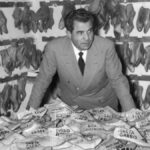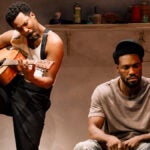
“Good Enemy” has all the narrative drive of a Douglas Sirk movie, and it is often just as pulpy as one of those 1950s melodramas. Yilong Liu’s new play, presented by Audible, had its world premiere Sunday at Off Broadway’s Minetta Lane Theatre.
On a very different level, “Good Enemy” also falls into the category of novels like “The Joy Luck Club,” “The Woman Warrior” and “The Bonesetter’s Daughter” in which an Asian character harbors a very dark secret about their former life in China. The big difference is that in “Good Enemy,” the lead character who has escaped from the People’s Republic of China in 1984 is male. He now lives in the San Gabriel Valley, and is estranged from his adult daughter, who lives in Brooklyn’s Williamsburg with her new boyfriend.
As it turns out, the daughter, Momo (Geena Quintos), isn’t the only one who wants answers from her father, Howard (Francis Jue), about his past. Due to the COVID pandemic in 2021, Howard decides to make a car trip across the United States, rather than fly or take a train, and has hired a young chauffeur, Dave (Alec Silver), to do all the driving. Dave also wants answers from Howard about his past, especially how he met and escaped from China with his future wife, Jiahua (Jeena Yi). Dave’s being from Los Angeles makes it no surprise that he dreams of being a screenwriter and thinks there’s a story he can sell to Hollywood based on his cross-country passenger.
That story is one that Sirk would have gobbled up, and it’s one that Liu and director Chay Yew turn into a melodramatic feast. Unlike Sirk, Liu does not tell a linear story. Not only are dollops of Howard and Jiahua’s story in repressive China sprinkled throughout this 105-minute one-act play, even the long car trip and the father-daughter meeting aren’t told chronologically. For example, Howard and Momo have their reunion before Howard and Dave arrive in Williamsburg. It could be a narrative mess, but Liu is an expert storyteller who knows just when to tantalize with another shocker regarding Howard’s past.
While Liu never lets up on the accelerator of his very purple narrative, he sometimes resorts to autopilot when it comes to the dialogue. All-American clichés like “We’ve got bigger fish to try” and “You’ll become the talk of the town” and “Stop looking for yourself in all the wrong places” and “You are sending me all the wrong signals” keep popping up. Those lines would be bad enough if spoken by the American characters, but here they’re spoken by the Chinese characters in China circa 1984. Since we’re supposed to believe they’re really speaking Mandarin or Cantonese, a certain stylization of language is required, and Liu rarely provides it.
This playwright is much better in a scene where the dialogue is filtered through Google Translation. Here, Howard’s talk with his daughter’s boyfriend, Jeff (the very self-deprecating Ryan Spahn), emerges as the play’s bright comic highlight. Curiously, Jeff is the only character not listed by his first name in the Playbill credits. Rather, he is called the White Boyfriend. It could be worse. Pre-pandemic, there was a play presented Off Broadway that identified the sole Caucasian character as the White Bitch.
Francis Jue rarely leaves the stage. Playing Howard, he watches from the sidelines not only when his younger self, Hao (Tim Liu), falls in love with Jiahua but when he takes instructions from a Communist officer Xiong (Ron Domingo) on how to be an undercover detective patrolling licentiousness in illegal underground clubs in China. Rest assured, “Good Enemy” doesn’t stint when it comes to the lurid.
Alec Silver is especially effective in making the Dave character far less of an L.A. cliché than he is. Jeena Yi also gives dimension to the sassy but essentially stick character that is Jiahua. In the role of Hao, Tim Liu could pull back on the nervous mannerisms. Considering what his character did to put himself into contact with the Communist Party apparatchiks, Hao is hardly the winsome male ingénue presented here.
Francis Jue, as always, is a performer who immediately connects with an audience. Here, however, his patented folksy charm often gets in the way of what is supposed to be a very desiccated man. Howard is not the fun uncle/mailman/next-door neighbor who shows up in a TV sitcom to deliver a few pithy jokes, which is often the way Jue plays this lead character.
Speaking of network television, the theater is the only other place in the world where long-estranged parents and their children get the chance to unload all the unexpressed love they have felt for each other, finally. Sirk knew how to give irony to those corny finales. Liu and Yew do not.
















